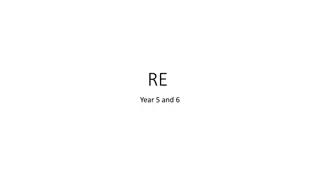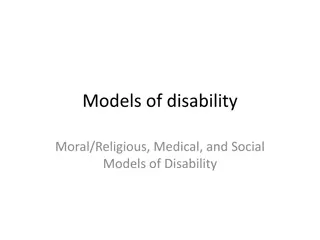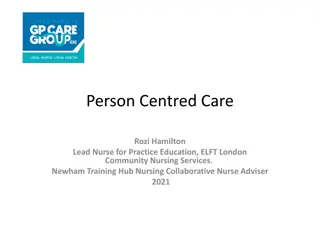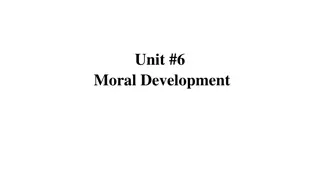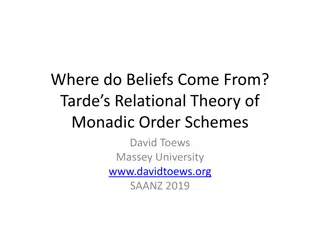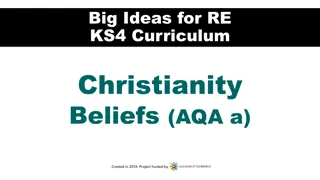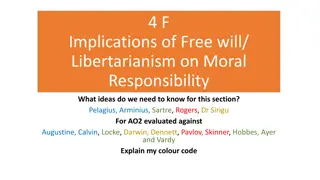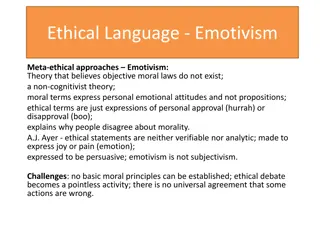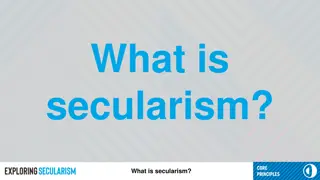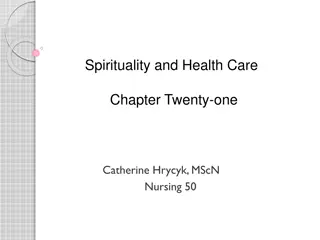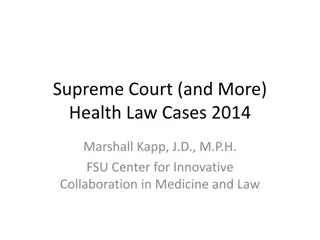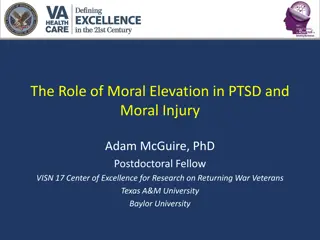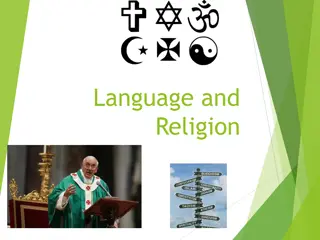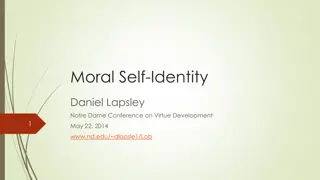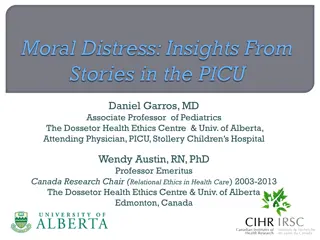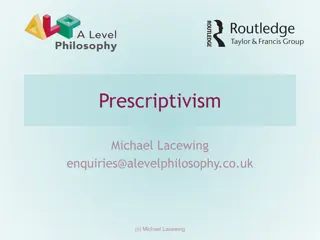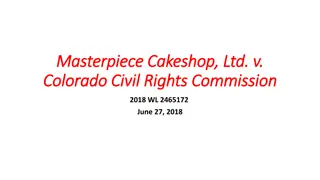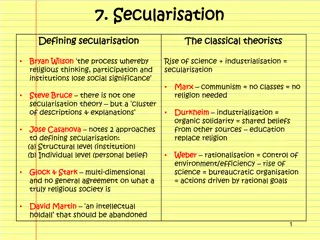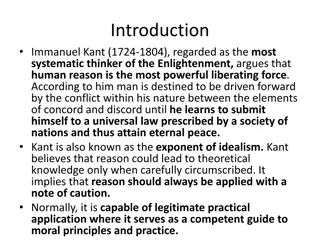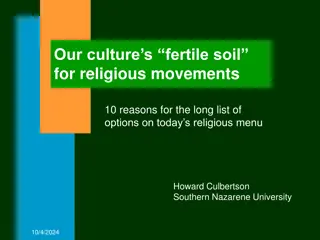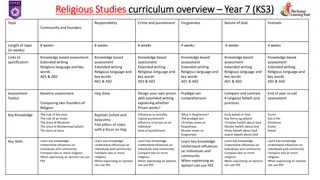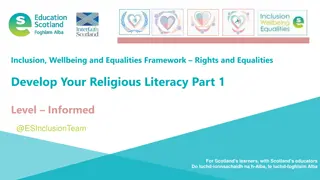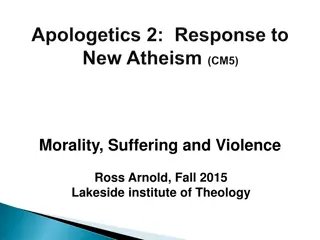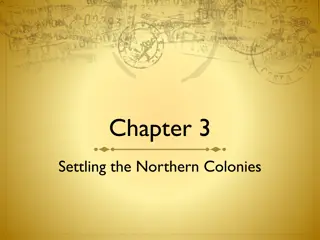Religious Education Skills Progression for Years 5 and 6
This document outlines the long-term plan for the RE curriculum for Year 5 and 6 students, focusing on topics such as living by Christian values, exploring wisdom from different faiths, understanding the creation of the world, and expressing faith through art. It also covers the progression of skill
0 views • 31 slides
Understanding Models of Disability: Moral, Medical, and Social Perspectives
The concept of disability is explored through moral/religious, medical, and social models. Impairment refers to a loss or abnormality in structure or function, while disability is a restriction in performing activities. The discussion also delves into the significance of person-first language and th
1 views • 35 slides
Overview of Religious Studies Course at Ramsey Grammar School
The Religious Studies course at Ramsey Grammar School for Year 9 students covers topics such as Christianity, Islam, Life and Death, Good and Evil, beliefs, practices, and church diversity. Students will be assessed through a written examination at the end of Year 11, with no coursework requirement.
0 views • 23 slides
Understanding Values, Beliefs, and Personal Values in Everyday Life
Our values and beliefs shape how we think, act, and make decisions in everyday life. Whether conscious or not, they influence our behavior and attitudes. This article explores the definitions and importance of beliefs, values, and personal values, highlighting how they impact individual decision-mak
0 views • 27 slides
Understanding Kohlberg's Stages of Moral Development
Kohlberg's stages of moral development, built upon Piaget's psychological theory, outline six developmental stages of moral reasoning, with each stage offering a higher level of response to moral dilemmas. Kohlberg focused on justice in moral development and emphasized the importance of how individu
0 views • 19 slides
Understanding Moral Development and Moral Reasoning
Moral development involves an individual's sense of right and wrong, influenced by family, school, friends, and societal environment. Children learn moral concepts from interactions with parents, teachers, peers, and society, shaping their understanding of good and bad. Additionally, moral reasoning
0 views • 13 slides
Elizabethan Religious Settlement: Unity Amidst Division
Amid religious division in England, Queen Elizabeth I implemented a Religious Settlement in 1559 to unify the country. The settlement, a blend of Protestant and Catholic elements, aimed to maintain peace and prevent rebellions. Elizabeth's strategic compromise pleased most people, though lingering t
0 views • 14 slides
Cultivating Beliefs: The Garden of Our Minds
In the garden of our minds, our beliefs are the seeds we plant and nurture. Just as we each have our unique soil, we develop beliefs about ourselves, others, and the world. We make decisions based on the strokes we receive from our environment, shaping our script. Reflect on the positive and negativ
0 views • 20 slides
The Origins of Beliefs: A Comparative Analysis of Tarde and Durkheim
Gabriel Tarde and Emile Durkheim engaged in philosophical debates on the origins of beliefs within societal structures. While Durkheim saw beliefs as integral to society's moral ideals, Tarde proposed a neo-monadological theory focusing on actors' beliefs within social practices. The discourse quest
2 views • 19 slides
Exploring Christianity: Beliefs and Key Concepts at KS4
This project delves into the foundational beliefs of Christianity, focusing on key concepts such as the nature of God, the Trinity, Jesus Christ, salvation, the afterlife, and the problem of evil. The curriculum covers diverse interpretations within Christianity, ethical dimensions, philosophical in
0 views • 4 slides
Understanding Religious Language: Cognitivism vs. Non-Cognitivism in the University Debate
This discussion explores the debate between cognitivism and non-cognitivism in religious language. Cognitivism asserts that religious claims aim to describe the world and can be true or false, while non-cognitivism argues that such claims express attitudes and cannot be verified. Flew's challenge qu
0 views • 9 slides
Moral Responsibility and Free Will Implications in a Contemporary Context
This text delves into the implications of free will and libertarianism on moral responsibility, examining the ideas of various philosophers and thinkers such as Pelagius, Arminius, Sartre, and more. It explores the concepts of moral agency, determinism, normative ethics, religious beliefs, and the c
5 views • 12 slides
Understanding Emotivism in Ethical Philosophy
Emotivism is a meta-ethical theory that rejects objective moral laws, instead positing that moral terms express personal emotional attitudes, not universal truths. Influenced by A.J. Ayer and rejecting naturalism, this theory suggests that ethical statements are not objective propositions but rather
0 views • 28 slides
Understanding Secularism: Balancing Freedom of Religion
Secularism encompasses a range of ideas aimed at balancing freedom of and from religion with other rights. It advocates for the separation of religious institutions from state institutions to prevent discrimination and privilege based on religious beliefs. Secularism emphasizes the neutrality of the
1 views • 22 slides
Understanding Spirituality and Health Care in Nursing Practice
Exploring the concepts of spirituality, religious versus secular perspectives, spiritual distress, and the role of nurses in providing spiritual support during times of transition and vulnerability. Spirituality is defined as a sense of meaning in life and inner spirit, central to creating beliefs a
0 views • 11 slides
Supreme Court Health Law Cases 2014 Review
The Marshall Kapp, J.D., M.P.H. review of Supreme Court health law cases in 2014 focuses on Burwell v. Hobby Lobby Stores and Conestoga Wood. The cases involved challenges to the Affordable Care Act's contraceptive requirement based on the Religious Freedom Restoration Act of 1993. The court ruled i
0 views • 19 slides
Understanding Moral Elevation in PTSD and Moral Injury
The research by Dr. Adam McGuire explores the role of moral elevation in PTSD and moral injury, emphasizing how witnessing virtuous behaviors triggers emotional and physical responses leading to a desire for imitating virtuous acts. By integrating prosocial emotions into trauma treatment, the positi
0 views • 13 slides
Understanding the Role of Language in Religion
Exploring the significance of language in religious contexts, this content discusses the functions, features, lexicon, grammar, and metaphorical aspects present in religious language. It delves into how religious language upholds spiritual beliefs, persuades believers, and expresses specific attitud
0 views • 8 slides
Understanding the Cultural Dimensions of Food and Religious Influences in Culinary Arts
Explore the impact of religious beliefs on food traditions and dietary restrictions across different cultures in the culinary world. Learn about the influence of major world religions on eating habits, food choices, and culinary practices. Discover how various religious groups, such as Christians, o
0 views • 26 slides
Challenges to Moral Anti-Realism: Objections and Responses
The article explores objections to moral anti-realism, including moral nihilism, condemning immorality, and the notion of moral progress in the absence of moral reality. It addresses concerns about the justification for interfering with others' behavior, the relationship between moral beliefs and ob
0 views • 6 slides
Understanding Moral Self-Identity Development
Situating moral self-identity within ethical theory and developmental psychology, this overview explores the centrality of morality within the self-concept. It discusses the chronic accessibility of moral schemas, the importance of strong evaluation in moral behavior, and the connection between mora
0 views • 33 slides
The Influence of Disgust on Moral Behavior in Psychological Research
Explore the impact of disgust on moral behavior through various studies, including moral dilemmas and criteria for moral judgment. Research delves into how disgust affects decision-making processes related to moral dilemmas and helping behavior. Discover the connection between physical disgust and i
0 views • 16 slides
Understanding Moral Distress in Healthcare
This content discusses the concept of moral distress in healthcare, defined as the pain and anguish experienced when one knows the right thing to do but faces internal or external barriers preventing action. It explores the implications of moral distress on healthcare practitioners and emphasizes th
0 views • 25 slides
Exploring Moral Judgments and Prescriptive Meaning in Ethics
This content delves into non-cognitivism, Hare’s prescriptivism, and moral anti-realism to understand what we do when making moral judgments. It discusses prescriptive meaning, the concept of good, and how moral language guides actions. The objections raised regarding moral language's functions, p
0 views • 9 slides
Masterpiece Cakeshop Case: Religious Beliefs vs. Anti-Discrimination Laws
In the Masterpiece Cakeshop case, Jack Phillips, a devout Christian baker, refused to create a custom wedding cake for a same-sex couple due to his religious beliefs. This led to a legal battle addressing the clash between religious freedom and anti-discrimination laws. The case explores the complex
0 views • 71 slides
Understanding Religious Language: Flew, Hare, Mitchell
Exploring the contrasting views of cognitivism and non-cognitivism in the context of religious language through the perspectives of Flew, Hare, and Mitchell. Delve into Flew's challenge on the undetectable gardener, Hare's concept of bliks, and Mitchell's response to the rationality of religious bel
0 views • 7 slides
Religious Accommodation in the Army: Advising Command
The content discusses the role of the Chaplain Corps in advising Soldiers and leaders on religious accommodation in the Army as of February 13, 2019. It covers learning objectives, legal foundations, Army policies, procedures, recent changes, and references related to religious accommodation. The in
0 views • 36 slides
Friedrich Nietzsche's Genealogy of Morals: Uncovering the Evolution of Moral Values
Friedrich Nietzsche critiques traditional philosophy for overlooking the historical development of moral concepts. He argues that moral judgments were initially based on strength and power, later evolving into the dichotomy of master and slave morality. By tracing the genealogy of moral terms, Nietz
0 views • 10 slides
Understanding Religious Discrimination Laws in California Workplace
Learn about the regulations and protections under FEHA and Title VII in California, including religious exemptions, accommodation requirements, case studies, and best practices to address discrimination issues effectively. Discover the statistical insights on religious discrimination complaints and
0 views • 45 slides
Understanding Secularisation: The Decline of Religious Influence in Society
Secularisation refers to the process in which religious thinking, participation, and institutions lose their social significance. This phenomenon is influenced by factors such as the rise of science, industrialisation, changing social attitudes, and the disengagement of the church from society. Evid
0 views • 8 slides
Philosophers' Views on Religious Experience: Insights and Critiques
This lesson delves into the perspectives of various philosophers such as Rudolph Otto, Richard Swinburne, John Hick, and Michael Persinger on religious experiences. It explores concepts like the numinous, religious knowledge, God's existence, and criticisms on the validity of religious experiences.
0 views • 7 slides
Philosophers' Views on Religious Experience: Insights from William James
Explore William James' perspective on religious experiences, including his views on existential and value judgments. Understand how James argued for the validity of religious experiences and their potential proof of God's existence. Delve into the implications of emotions and prior beliefs on interp
0 views • 7 slides
US Religious Freedom Restoration Act (RFRA) Overview
The US Religious Freedom Restoration Act (RFRA) aims to protect the free exercise of religion by ensuring that governments do not substantially burden religious practices without compelling justification. It emphasizes striking a balance between religious liberty and governmental interests through t
0 views • 9 slides
Kant's Moral Philosophy: Reason, Freedom, and the State
Immanuel Kant, a prominent Enlightenment thinker, emphasizes the liberating power of human reason in guiding individuals towards moral principles and practices. Kant's moral philosophy centers on treating each person as an end-in-itself, driven by the good will informed by reason. His concept of mor
0 views • 14 slides
Understanding the Fertile Ground of Cultural Influences on Religious Movements
Cultures provide fertile soil for diverse religious movements due to various factors such as secularism, existential uncertainties, disillusionment with leaders, and a deep human longing for transcendence. Other contributing factors include breakdown of traditional social structures, moral relativis
0 views • 13 slides
Religious Studies Curriculum Overview for Year 7 and 8 (KS3)
Explore various topics such as responsibility, crime and punishment, forgiveness, nature of God, festivals, community, founders, worship, creation, life after death, rules and laws, relationships in this detailed Year 7 and 8 (KS3) Religious Studies curriculum. The curriculum includes assessments, e
0 views • 6 slides
Insights into the Beliefs of the Shang Dynasty
Discover the religious beliefs of the ancient Shang people, including their worship of Shang Di as the supreme deity, the importance of ancestor worship, and the practice of using oracle bones for divination. Explore the tomb of Fu Hao for clues about Shang beliefs and rituals. Engage with images an
0 views • 9 slides
Developing Religious Literacy for Educators in Scotland
This resource aims to enhance educators' understanding of religious literacy by exploring religious discrimination, core beliefs of major faiths, and additional learning sources. It encourages educators to consider the needs of learners in relation to their religious beliefs in Scotland.
0 views • 30 slides
The Debate on Objective Morality: The Atheistic Perspective
The discussion delves into the concept of objective morality and its relation to religious beliefs and atheism. It explores why most people believe in objective morality even though atheists argue against its existence based on evolutionary theories. The argument is centered on the existence of a hi
0 views • 13 slides
Settling the Northern Colonies: Religious Transformation and Colonization
The Protestant Reformation led to the emergence of Puritanism in the Northern Colonies, with figures like Martin Luther and John Calvin shaping religious beliefs. The Massachusetts Bay Colony stood as a beacon of self-government and religious ideals, while dissenters like Anne Hutchinson and Roger W
0 views • 9 slides
